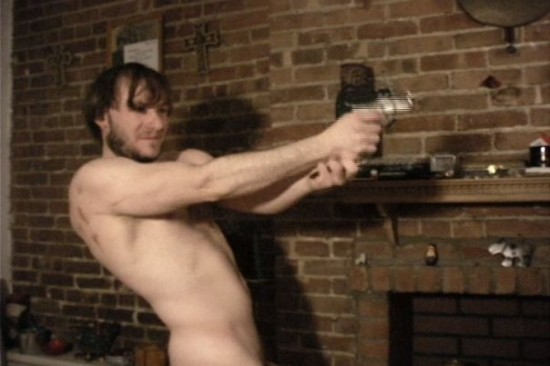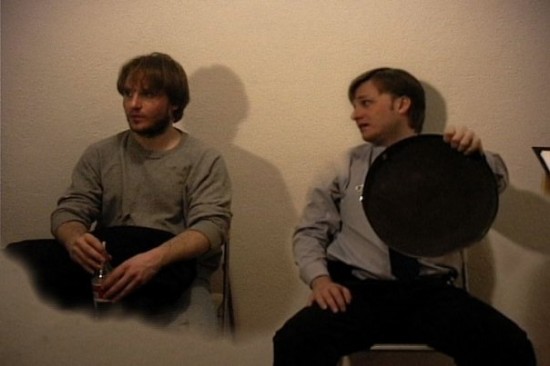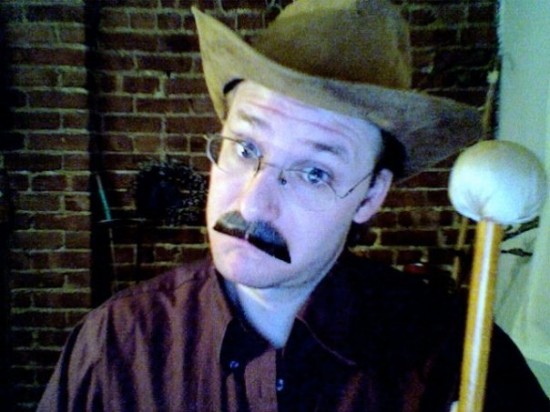Weekend Weirdness: Flooding With Love For The Kid, The One-Man Recreation Of Rambo: First Blood Set In An NYC Apartment. Interview And Clip.
It's a crazy, mixed up world and we are thankful for movies, sans The Tooth Fairy, that offer proof. Weekend Weirdness examines such flicks, whether in the form of a new trailer for a provocative indie, a mini review, or this...
Variations on the utterance, "I wish there was something to do," number in the hundreds to thousands daily in New York City. It's a minor grumble that can be overheard even as many a boredom-stricken city dweller is in a bout of multi-tasking worthy of a wintery-layer-obsessed Inspector Gadget. These frequent sentiments both ignore and are at the source of the unbridled creativity occurring around them: somewhere in the city, people are launching unrelated search-and-destroys on boredom in new ways. In the case of a determined 20something actor and filmmaker named Zachary Oberzan, it was via a feature-length adaptation of First Blood...set entirely in a 220-square-foot Manhattan apartment and starring himself as roughly two dozen male and female characters. The resulting film—which cost $96, was made over seven months, and was edited by Oberzan in Final Cut Pro—is called Flooding with Love for the Kid.
In the role of iconic Vietnam vet John Rambo, Oberzan ostensibly fought the law and the law won. Which means Oberzan still won, because they are one in the same and so forth. In a superlative scene in Flooding, Oberzan is show on screen as six different armed men firing shotguns at Rambo in a display of deliberately amateur but charming effects. That the scene, like most of the film, is set deep in a Kentucky wilderness conveyed by makeshift twigs and grimy urban brick should be a lame or childish sight to the grown viewer. Instead, the scene is genuinely suspenseful, partially due to the claustrophobic restraints, and packs just enough Dogme-esque realism to earn a smile. Flooding is currently a subject of fun chatter in NYC, and has even been intensely praised by Rambo's creator, First Blood author David Morrell.
Unlike Sylvester Stallone's 1982 classic actioner, Oberzan made use of Morrell's original ending, in which Rambo and the relentless sheriff on the hunt for him both die. /Film chatted with Oberzan about the multiple meta meanings at the heart of Flooding's faithful conclusion and about many other aspects of his memorable, irony-free creation. A clip from the film and the interview after the jump...
Hunter Stephenson: You went full-frontal as Rambo in the film. What's been the response to this so far and what did full-frontal add to your movie and its tone? It makes the concept that much crazier, I think...Zachary Oberzan: My intention at the outset of the project was to make a film as true to the novel as possible. In the novel, when Rambo escapes from the police station he is naked. So I was naked. It simply kept the tone honest. Depending on any given person's relationship with nudity, they then project that onto the film. Some giggle, some are turned on, some are shocked. Something very unfortunate happened though because of this.
There is a .2-second flash of that scene in the trailer. When the trailer started getting thousands of hits on YouTube, it was flagged for the nudity, deleted, and I got bumped off YouTube. And Facebook, too. I wonder if someone was actually offended by the nudity, or if it was just some bitter filmmaker out there who was jealous of the notoriety it received. Either way, the world at some point is going to have to come to terms with my penis. Anyway, I did a bit of editing on the trailer, and now there's a big black spot, like in Borat. And now it's back on YouTube.
So, you weren't also paying homage to Sylvester Stallone in Party at Kitty and Stud's? And did you similarly work-out to play Rambo?Zachary Oberzan: No. Haven't seen that yet; would like to. I've been obsessed with body image my whole life. I have a bit of that body dysmorphic disorder. I come from a family of body builders. So I've been working out every day for years. However, I intentionally did not flex in the film, and actually tried to stick my gut out when playing older characters. The Stallone version is about muscles and explosions, and that's great, but I didn't want to copy that.The $96 budget is mentioned on screen during the end credits. Did the idea for the film come about from creative frustration? What does your film stand for as a personal statement; and what do you hope it inspires in others?Zachary Oberzan: First and foremost, I want to say that the initial impulse to make this film was love. Love for the story and its characters. And a love of film. But much has been made of it being a "fuck you" to Hollywood; I do admit that what fueled some of my drive came out of frustration. I think I'm a talented, hard-working disciplined actor and artist, but the film industry had no use for me. I couldn't even pay an agent to talk to me. Herein lies that meta-aspect of the film. [General Samuel] Trautman says of Rambo in the novel, "He gave up three years to enlist in a war that was supposed to help his country, and the only trade he came out with was how to kill. Where was he supposed to get a job that needed experience like that?!"
Well, I gave up 12 years to enlist in a career that was supposed to help the film industry, and the only trade I came out with was how to make art. Where was I supposed to get a job that needed experience like that? And so I just threw away the whole notion of the system. I wasn't going to wait for anyone's permission any more to be an actor and filmmaker. I don't need them, as I have demonstrated. And more importantly, I threw away the notion that a film has to look a certain way, have certain production values...to be taken seriously. I approached this with the seriousness of a $100 million dollar project. But I only had $100. But who cares? What do you really need to make a great film? What I hope this inspires in others is to get over that hurdle of thinking that money is the answer. That you need money to make a great film.
Not to say that a big budget film can't be great too. At some point I'll do a big budget version of First Blood. But it won't be any better than this version. It will just be different. Money is just a tool. Working with what you've got will inspire your creativity in new ways. I mean, I could have spent more than $100 to make this film. I'm not broke. But I wanted to see how little was necessary, and how I could push my creativity. I also hope it inspires in others a sense of "there's no right or wrong way to make a film"; that is, a film with no production values has to be taken as seriously as Avatar. If not more seriously.
 What about David Morrell's novel, First Blood, appealed to you when compared to Stallone's film adaptation? Did you choose to use Morrell's ending to change-up expectations for viewers familiar only with the film version? I'm guessing that the book's ending was a revelation, as it so poetically and metaphorically plays into your title...Zachary Oberzan: The bloodline is this: I saw the Stallone movie when I was nine or 10 years old, when we had free HBO for a weekend. I was quite mesmerized and touched by it. A few months later I saw the book in a grocery store's book section. I thought, wow, I loved this movie, I want to read the book. I was still about 10 years old. I fell in love with the book as a I read it; as often happens when novels get turned into screenplays, you lose incredible amounts of detail. When I came to the end, I couldn't believe it. Rambo dies? That's not right.
What about David Morrell's novel, First Blood, appealed to you when compared to Stallone's film adaptation? Did you choose to use Morrell's ending to change-up expectations for viewers familiar only with the film version? I'm guessing that the book's ending was a revelation, as it so poetically and metaphorically plays into your title...Zachary Oberzan: The bloodline is this: I saw the Stallone movie when I was nine or 10 years old, when we had free HBO for a weekend. I was quite mesmerized and touched by it. A few months later I saw the book in a grocery store's book section. I thought, wow, I loved this movie, I want to read the book. I was still about 10 years old. I fell in love with the book as a I read it; as often happens when novels get turned into screenplays, you lose incredible amounts of detail. When I came to the end, I couldn't believe it. Rambo dies? That's not right.
I went back and read that page three times, like, I must have read it wrong, I saw the movie, he doesn't die! That was a real turning point of maturity for me, realizing that books could be different, and much darker, than the film versions. Rambo dying in the book was like when i found out Santa Claus didn't exist. But of course it makes the story that much more a tragedy. It really is a Greek tragedy.
Anyway, I loved the book, it became my favorite, and I read it numerous times over the years. It's an extremely poignant story for me. This became the basis for "Rambo Solo," a one-man theater piece I did with Nature Theater of Oklahoma that ran off-Broadway last spring and is continuing to tour. And it was while working on "Rambo Solo" I decided to take myself up on this challenge I had been playing around with in my head, to make a true-to-the-novel adaptation of the whole film in my apartment. The main appeal in the novel for me, as opposed to the Stallone version, is that it's not all black and white. The novel is as much about [small-town sheriff Will] Teasle, if not more, than Rambo. And neither of them are completely innocent or completely guilty. It's interesting to see that in Stallone's latest Rambo movie, the character has become much closer to how he was originally conceived by Morrell.
 On one level, the film works as a commentary on the isolation and madness that can be the side-effect of metropolitan cabin fever; and on another, there are Lynchian ideas about identity that arise. Did you think about any of this? You call the film a "one-man war"; did you almost grow unstable playing so many characters in such a tight space?Zachary Oberzan: All of these conceptual ideas are interesting to look at after the fact, but the truth is, I had a very simple goal: to make this film with what I had. I had myself and the crap in my apartment. I wasn't working with any abstract ideas about what it is to make a film by yourself, all the theoretical implications of such a project, an so on. I was only working practically and pragmatically. I was far more concerned about running out of barbecue sauce, which I used for bat shit. And me, unstable? No way.Let's talk a bit about the props. How was the movie's $96 budget divided?Zachary Oberzan: Most of that went to mini-DV tapes. I shot 12 tapes, so that was $60. And the two exceptions I made about bringing in outside props...I really wanted to have a green beret. I didn't want that to be representational. But I really wanted one anyway, and now I wear it just for fun. And the guns. I didn't want anything representational for the guns. Maybe just because I really like guns. So I bought the guns—they're plastic BB guns—and the green beret from eBay. They were all pretty cheap, but the shipping was like $20.What about the mouse featured in the film's nature scenes? [laughs] Was it dead and was it caught in the apartment?Zachary Oberzan: Yes, and that's in keeping with the idea of using anything and everything in my apartment. During shooting I came home one day from my day job and found a dead mouse. Well, I'm making a movie that takes place out in the woods—this is really lucky I thought. So I put him in the flick.Did you consider using actual mud instead of soaked linens for the iconic forest scene?Zachary Oberzan: Good question. In hindsight I kind of wish I had, but then I'd be breaking that rule about bringing outside stuff in. But ultimately, it's unnecessary. I think it's better that it's towels, because every one can relate to that. To towels. It's like, part of the charm of the film is that anyone watching it can say to themselves, hey I could make a film in my apartment too. "I've got all that stuff." And with the props, as I mentioned earlier, I wanted to see how far I could push the realism with what I had. The remarkable thing about this film is that at first you giggle to see a toaster stand in for a ham radio, but by the end, it doesn't matter what is "real" or not. The emotions are real, the piece is sincere, and that's all that is important.
On one level, the film works as a commentary on the isolation and madness that can be the side-effect of metropolitan cabin fever; and on another, there are Lynchian ideas about identity that arise. Did you think about any of this? You call the film a "one-man war"; did you almost grow unstable playing so many characters in such a tight space?Zachary Oberzan: All of these conceptual ideas are interesting to look at after the fact, but the truth is, I had a very simple goal: to make this film with what I had. I had myself and the crap in my apartment. I wasn't working with any abstract ideas about what it is to make a film by yourself, all the theoretical implications of such a project, an so on. I was only working practically and pragmatically. I was far more concerned about running out of barbecue sauce, which I used for bat shit. And me, unstable? No way.Let's talk a bit about the props. How was the movie's $96 budget divided?Zachary Oberzan: Most of that went to mini-DV tapes. I shot 12 tapes, so that was $60. And the two exceptions I made about bringing in outside props...I really wanted to have a green beret. I didn't want that to be representational. But I really wanted one anyway, and now I wear it just for fun. And the guns. I didn't want anything representational for the guns. Maybe just because I really like guns. So I bought the guns—they're plastic BB guns—and the green beret from eBay. They were all pretty cheap, but the shipping was like $20.What about the mouse featured in the film's nature scenes? [laughs] Was it dead and was it caught in the apartment?Zachary Oberzan: Yes, and that's in keeping with the idea of using anything and everything in my apartment. During shooting I came home one day from my day job and found a dead mouse. Well, I'm making a movie that takes place out in the woods—this is really lucky I thought. So I put him in the flick.Did you consider using actual mud instead of soaked linens for the iconic forest scene?Zachary Oberzan: Good question. In hindsight I kind of wish I had, but then I'd be breaking that rule about bringing outside stuff in. But ultimately, it's unnecessary. I think it's better that it's towels, because every one can relate to that. To towels. It's like, part of the charm of the film is that anyone watching it can say to themselves, hey I could make a film in my apartment too. "I've got all that stuff." And with the props, as I mentioned earlier, I wanted to see how far I could push the realism with what I had. The remarkable thing about this film is that at first you giggle to see a toaster stand in for a ham radio, but by the end, it doesn't matter what is "real" or not. The emotions are real, the piece is sincere, and that's all that is important. Do you see any irony in obsessively recreating a story about a VietNam vet in an apartment as other comparable wars are going on? Do you believe the film be viewed at all in a generational context?Zachary Oberzan: No, I don't see any irony here, and no, it shouldn't be viewed in a generational or political context. I have great antipathy towards art that tries to make political points. That implies you know something politically that others don't, that you understand the world better, and you have to explain it to them. It's very condescending.
Do you see any irony in obsessively recreating a story about a VietNam vet in an apartment as other comparable wars are going on? Do you believe the film be viewed at all in a generational context?Zachary Oberzan: No, I don't see any irony here, and no, it shouldn't be viewed in a generational or political context. I have great antipathy towards art that tries to make political points. That implies you know something politically that others don't, that you understand the world better, and you have to explain it to them. It's very condescending.
And wars come and go. There are always going to be VietNams, there will always be debates about whether or not this war or that was necessary. While First Blood was born out of a very specific era—Morrell wrote it during the war, and was attempting to show both points of view—its genius is that it transcends any one war. Like Leonard Cohen, who is the other great influence in my life besides Rambo, says, "The war, it will be fought again. The Holy Dove, she will be caught again. Bought and sold and bought again. The dove is never free."
Yeah, I dig Cohen. Nice quote. Do you have flashbacks [of making the film]?Zachary Oberzan: No. I have nightmares though.The film is currently playing at Film Archives here in NYC. When you conceived the film, did you expect theatrical screenings? And would you recommend /Film readers see the film on the big screen or on DVD?Zachary Oberzan: When I started making it, I was just making it for myself. Only when some friends saw some of the footage, and were very enthusiastic and supportive, did I start thinking about going public with it. It's a major motion picture so I think it is best seen on the big screen, but it looks good on DVD too; and there is something fitting that you watch this film in your own apartment.
When I first finished the film, I decided to share it, but had to means to do that, so I wrote on my website that I made this flick in my apartment, and if anyone wanted to see it, I'd come to their apartment and show it t them. Only one person took me up on it. I went over there and he and his girlfriend made me dinner and we watched it. It was fun.
Flooding with Love for the Kid is now on DVD. For more info: websites for the film and its writer/director/editor/caterer/actors Zachary Oberzan.Hunter Stephenson can be reached at h.attila/gmail and on Twitter. For all previous installments of Weekend Weirdness on /Film, here.
